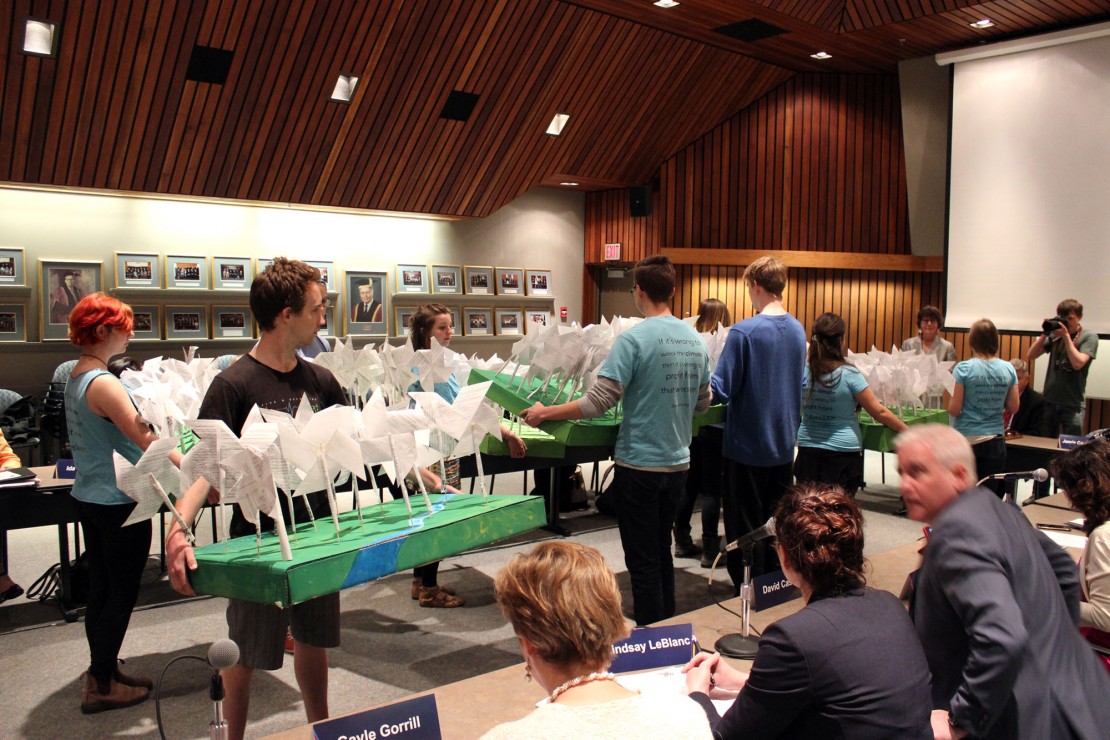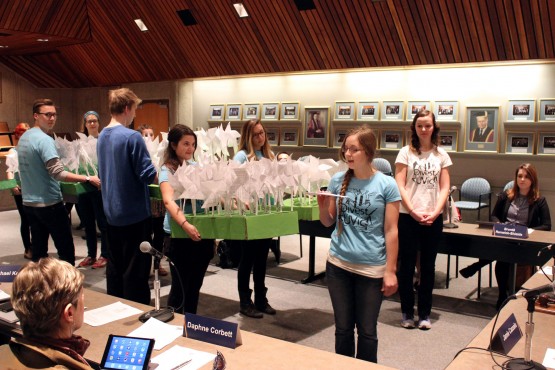
Divest UVic presents the Board of Governors with over 200 handmade wind turbines made from student petitions. Photo by Myles Sauer
The UVic Board of Governors stood firm on two big issues March 30 by stalling any decision regarding divestment from fossil fuels, and passing the budget framework for the 2016-17 fiscal year that includes a six per cent increase to residence fees.
The two issues were the subject of numerous protests this year, both in and out of the Senate and Board Chambers.
Divest left blowing in the wind
Members of Divest UVic staged a demonstration at the meeting, presenting the board with over 200 origami wind turbines (read: pinwheels) and a student petition including 4 200 signees calling on the university to divest from fossil fuels.
Addressing the board, Divest member Ida Jorgenson said that by continuing to delay making a decision, the board “clearly demonstrated that [it stands] with fossil fuel companies.”
Jorgenson then presented President Jamie Cassels with a USB stick containing the 4 200 signatures, to which Cassels replied, “Message received, thank you.”
In an open letter posted on its Facebook page, Divest condemned the board for “[abdicating its] responsibility to the [University of Victoria] Foundation Board, a body even less accountable than [its] own.”
The UVic Foundation is responsible for the management of endowment funds, and is governed by a 15-member Board of Directors.
According to student governor Brontë Renwick-Shields, efforts to schedule a meeting between Divest and the board, including the Foundation’s chairperson, have been hindered by scheduling issues. Speaking with the Martlet, Renwick-Shields said that Divest was told they might be able to meet with the chairperson in “a few months.”
During its external relations update, the Board of Governors acknowledged that Divest wanted a meeting with the Foundation, but would not provide any further details of how that might happen.
The demonstration took place the same day that the University of Toronto rejected an internal committee’s recommendation that the university divest its own holdings from fossil fuel companies. That decision was condemned by UofT350, a student-led environmental justice advocacy group.
Residence fee increases get the go-ahead
Another thorny issue was a six per cent increase to residence fees as part of the 2016-17 budget framework. The increase is part of a 10 year plan to address deferred housing maintenance, which was indicated in the 2015-16 budget framework to total $119 million.
In particular, this year’s increase would provide $5 million to address McGill residence exteriors, family housing deck replacements, the Gordon Head fire alarm and electrical system, and Brown and Poole window replacements.
Fees already went up last year by 13 per cent, though documents show that residence fees are still below other institutional averages. While a six per cent increase would bring UVic residence fees to an average of $4 904 per year, other institutions will average $6 186.
Both Renwick-Shields and student governor Kayleigh Erickson oppose fees going any higher.
“This [budget framework] further excludes low and middle-income students,” said Renwick-Shields. She reiterated statements from a Nov. 24 board meeting where she pointed out that the fee increases exceeded the legal limit for rent increases in B.C.
Erickson agreed. “I firmly believe that the university should be creating affordable housing solutions,” she said, and urged the university to look into alternate solutions.
Cassels also reiterated previous statements about the issue, saying that funding issues like this one require striking a balance between affordability and access.
The motion to approve the budget framework carried, with eleven votes for and four against.








